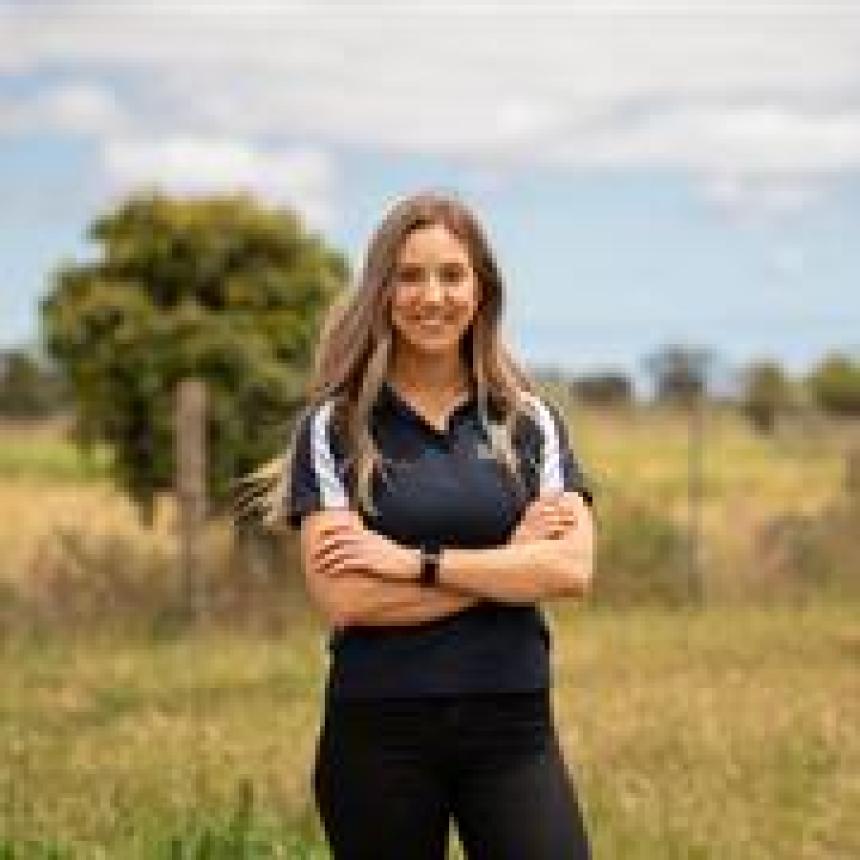Ms Bobbie Lewis Baida
Grant-Funded Research Associate
School of Animal and Veterinary Sciences
College of Sciences
Eligible to supervise Masters and PhD (as Co-Supervisor) - email supervisor to discuss availability.
My research focuses on understanding and improving the physiological and reproductive performance of sheep under variable and challenging environmental conditions. My PhD explored thermoregulation in sheep, with a particular focus on core body temperature responses to heat stress and the downstream impacts on behaviour, fertility, and fetal development. I validated novel temperature-sensing technologies in field settings and demonstrated repeatable variation in thermal profiles between individuals, highlighting the potential for physiological traits to support selection for heat tolerance. Building on this foundation, my current work investigates reproductive performance in Australia’s shedding sheep flock, with a focus on breed differences, climate resilience, and adaptive traits. I am particularly interested in how environmental stressors, such as heat, interact with genetics, physiology, and management to influence fertility outcomes. My research aims to develop practical tools and insights that support sustainable, climate-resilient sheep production systems.
| Year | Citation |
|---|---|
| 2022 | Lewis Baida, B. E., Baumert, M., Kushwaha, A., Swinbourne, A. M., Leu, S. T., & Van Wettere, W. H. E. J. (2022). Validation of indwelling vaginal sensor to monitor body temperature in ewes. Animal Biotelemetry, 10(1), 11 pages. Scopus4 WoS4 |
| 2021 | Lewis Baida, B. E., Swinbourne, A. M., Barwick, J., Leu, S. T., & van Wettere, W. H. E. J. (2021). Technologies for the automated collection of heat stress data in sheep. Animal Biotelemetry, 9(1), 4-1-4-15. Scopus50 WoS44 |
| 2020 | Brougham, B. -J., Weaver, A. C., Swinbourne, A. M. F., Lewis Baida, B. E., Kelly, J. M., Walker, S. K., . . . Van Wettere, W. H. E. J. (2020). Maternal Supplementation with Dietary Betaine during Gestation to Improve Twin Lamb Survival.. Animals (Basel), 10(10), 14 pages. Scopus17 WoS15 Europe PMC9 |
I am currently employed full-time (1.0 FTE) as a postdoctoral researcher on the national project “Quantifying and Improving the Reproductive Performance of Australia’s Shedding Sheep Flock” (2023–2027), funded by Meat & Livestock Australia (MLA). This industry-focused project aims to benchmark reproductive performance across diverse environments and identify management strategies that can improve the reproductive output of Australia's shedding sheep flock. In addition to this role, I have been the recipient of several competitive personal grants and awards in recognition of my research into heat stress physiology, on-animal temperature monitoring, and the impacts of thermal load on sheep reproduction in Merinos. These include:
- 2024 LambEx Coles Trailblazer Award – Recognised for innovation and leadership in the sheep industry, focusing on real-world applications of heat stress research
- 2022 Premier’s Climate Change Council – SA Climate Leaders Award (Winner) – For impactful research advancing climate adaptation in sheep production systems
- 2022 Science and Innovation Award for Young People in Agriculture, Fisheries and Forestry – Awarded by the Australian Government Department of Agriculture, Fisheries and Forestry, sponsored by Australian Wool Innovation, for a project on heat stress monitoring and its links to reproductive outcomes in rams
- 2021 SARDI Science Bursary for Women – To support research into thermoregulation and sensor technologies in grazing sheep and their application to reproductive management
I have also received smaller internal funding through SAVS seed and travel grants to support pilot research activities, conference presentations, and collaboration development. These projects have collectively advanced knowledge and tools for understanding thermal stress in grazing systems, with a strong focus on field validation, reproductive implications, and practical on-farm solutions.
Since 2020, I have been involved in sessional teaching across a range of undergraduate animal and veterinary science courses at the University of Adelaide. My responsibilities have included practical demonstration, tutorial preparation and delivery, student communication, and formal assessment. I work closely with course coordinators to support student learning and contribute to the effective delivery of both hands-on and theoretical content.
Courses I have contributed to include:
- Animal Handling and Husbandry (2020–2023, with Dr William van Wettere) – practical demonstration and student engagement
- Principles of Animal Behaviour, Welfare and Ethics (2020–2022, with Dr Susan Hazel) – practical demonstration and support
- Livestock Production Science (2020–2022, with Prof Wayne Pitchford) – practical demonstration and student support
- Veterinary Animal Anatomy and Physiology (2022, with Dr Karen Kind) – practical delivery of anatomy-based activities
- Professional Skills in Animal Science (2022–2025, with Dr Karen Kind) – tutorial preparation and delivery on heat stress and global issues in livestock industries
- Professional Skills in Animal Science (2022, with Wendy Hamood) – practical demonstration support
In 2024, I supervised an Honours student investigating the use of oral melatonin supplementation to reduce heat stress in sheep, with a focus on comparing different methods of temperature collection in an intensive setting. I have also recently completed my Supervision Induction course and will officially begin co-supervising a Higher Degree by Research (HDR) student exploring thermoregulation, fertility, and behaviour in genetically divergent sheep breeds under field conditions. This experience reflects my ongoing commitment to student engagement, applied teaching, and research training in areas critical to the future of livestock production under changing environmental conditions.



